My Fall 2018 column for Cinema Scope. — J.R.
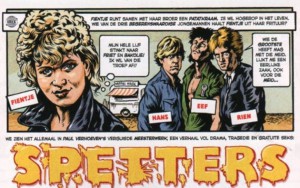
Paul Verhoeven gives exceptionally good audio commentary, especially on the Kino Lorber Blu-ray of Spetters (1980), a powerful feature about teenage motocross racers in a small Dutch town that I’ve just seen for the first time. Speaking in English, Verhoeven tells us a good deal about Dutch culture and life at the time his film was made; his own ideological motivations (such as his desire to depict accurately the behaviour of his young working-class characters) and personal contributions to the script (especially, but not exclusively, those relating to his early involvement with Pentecostal Christianity); his literary influences (in particular, the role played by Céline in conceptualizing the final sequence) and his strategies as a director (including the use of his own dog, who also turns up in The Fourth Man [1983]); his relations with his producer, his locations in and around Rotterdam, his cast and how he directed them; the differences between shooting in Holland and shooting in the US; the filming of stunts; his tricky dealings with Dutch government representatives to avoid censorship (which involved lying and subterfuge); the film’s disastrous initial critical reception, which had a lot to do with Verhoeven subsequently moving to Hollywood; and a great deal more. Read more
I believe that this essay was completed in spring 2010 — for a rather formidable book about Austrian experimental film edited by Peter Tscherkassky, Film Unframed: A History of Austrian Avant-Garde Cinema, available here and here and here. — J.R.
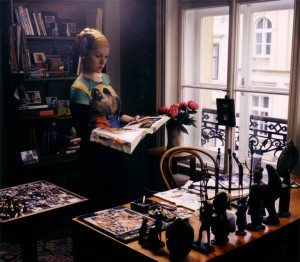
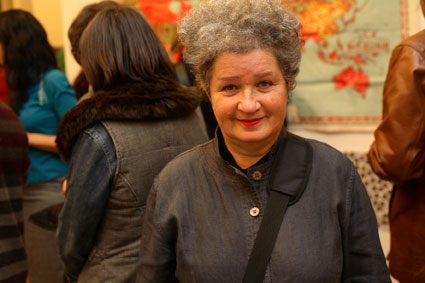
1
The lessons available from Lisl Ponger’s cinema take many forms, but perhaps one could claim that most of them are separate versions of the same lesson — the lesson of coming to terms with our own ignorance. This is already apparent in the most elementary way in the earliest film of hers I’ve seen, Film — An Exercise in Illusion 1 (1980), a travelogue in which any precise sense of what it is that’s traveling — the camera? the camera’s aperture? the scenery? — becomes ambiguous. More specifically, if the essence of film in general and film illusion in particular is motion, these three minutes of silent, super-8 shots of Venice, filmed from a moving boat — or maybe it’s one shot and/or several moving boats — features movement within the camera as well as outside it, through extreme changes in light. Which is another way of saying that we don’t really know what we’re watching, even if it’s the nature of film illusion to persuade us that we think we know, conning us into superimposing some touristic narrative over whatever we’re seeing. Read more
From the January 7, 2000 Chicago Reader. — J.R.
To preserve and present the best world cinema, France has the Cinematheque Francaise and England has the British Film Institute; we’ve got the American Film Institute, which doesn’t even have a clue about the best Hollywood movies. Consequently most younger American viewers have never seen a film by Alain Resnais, probably the greatest living French filmmaker, who’s never made an indifferent or unadventurous film and who’s much more talented and innovative than Francois Truffaut. From Resnais’ first three features, all masterpieces — Hiroshima, mon amour (1959), Last Year at Marienbad (1961), Muriel (1963) — to dazzling later works — Stavisky (1974), Providence (1977), Mon oncle d’Amerique (1980), Melo (1986) — he’s remained a master. On connait la chanson (1997), a more accurate translation of which might be “I Recognize the Tune,” was inspired by British screenwriter Dennis Potter (Pennies From Heaven); its characters frequently break into lip-synched French pop songs, which serve as cross-references to their moods and aren’t always bound by gender. (When Resnais made similar use of French film clips in Mon oncle d’Amerique, contemporary actress Nicole Garcia was cross-referenced with Cocteau’s actor Jean Marais.) A comedy about real estate and class differences, Same Old Song was the biggest hit of Resnais’ career in France at that point; it’s less popular among viewers unfamiliar with the music, but even if you can’t follow all the nuances, this is fun and different and at times mysterious (periodically revealing Resnais’ Surrealist roots), and it superbly captures Paris in the 90s. Read more
From the Chicago Reader (May 25, 2007). — J.R.
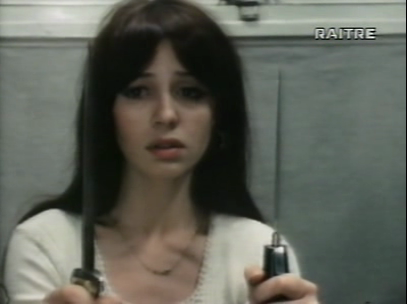
OUT 1 ****
DIRECTED BY JACQUES RIVETTE | WRITTEN BY RIVETTE AND SUZANNE SCHIFFMAN WITH PIERRE BAILLOT, JULIET BERTO, MICHEL DELAHAYE, JACQUES DONIOL-VALCROZE, FRANCOISE FABIAN, HERMINE KARAGHEUZ, BERNADETTE LAFONT, MICHELE MORETTI, AND ERIC ROHMER
WHEN Sat 5/26, 2:30 PM (episodes 1 and 2) and 7 PM (episodes 3 and 4); Sun 5/27, 2:30 PM (episodes 5 and 6) and 6:45 PM (episodes seven and eight)
WHERE Gene Siskel Film Center, 164 N. State
PRICE $30
INFO 312-846-2600
MORE Box meals from Whole Foods will be available during dinner breaks for $10, but must be ordered by Thu 5/24.
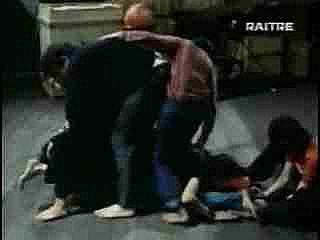
***
QUESTION: Why did you choose the title Out?
RIVETTE: Because we didn’t succeed in finding a title. It’s without meaning. It’s only a label. — from a 1974 interview

Jacques Rivette has made several good films and four great ones, consecutively: L’Amour Fou (four hours, 1968), Out 1 (12 hours, 1971), Out 1: Spectre (four hours, 1972), and Celine and Julie Go Boating (three hours, 1974). It’s not their epic length that sets these apart from the rest of his filmography — there are others by Rivette that are plenty long — but their improvisatory nature. Read more






